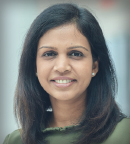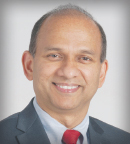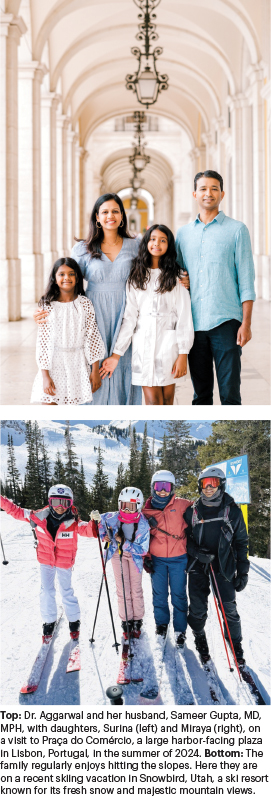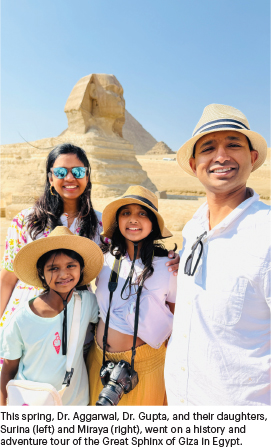At just 5 years old, Charu Aggarwal, MD, MPH, FASCO, already knew that she wanted to be a physician when she grew up, although she can’t explain where the idea came from. She just knows the desire to help others was ingrained in her from a very early age.
Growing up in New Delhi, India, where education and personal achievement rank high on the list of family priorities, Dr. Aggarwal felt a great sense of wanting to be of service. The youngest of three daughters, she was raised in a goal-oriented household that put a premium on the importance of working hard, getting a good education, and making a meaningful contribution to society. “The idea of becoming a physician stemmed from wanting to do good in the world,” said Dr. Aggarwal.
CHARU AGGARWAL, MD, MPH, FASCO

On the appeal of clinical research in lung cancer: “The biology of lung cancer was just beginning to be understood, and targeted therapies, such as EGFR and ALK inhibitors, were emerging in clinical practice. The field was rapidly evolving, and it felt like we were on the cusp of a new era in lung cancer treatment.”
On overcoming professional challenges: “I’ve been incredibly fortunate to have had outstanding mentors, sponsors, and institutional support throughout my journey. Their guidance and encouragement have played a critical role in helping me grow as a clinician, researcher, and academic leader.”
On the role of ASCO in her career: “I was fortunate to have been part of ASCO’s 2019 Leadership Development Program, which I’ve described as an inflection point in my career. Being involved with ASCO has also provided me with a sense of community. I’ve made so many connections through ASCO and have received such wonderful advice from colleagues there.”
After graduating from Lady Hardinge Medical College, in 2003, an all-girls medical college in New Delhi, Dr. Aggarwal moved to the United States to attend the University of Alabama, in Birmingham, where she received a MPH in 2005. She then completed her residency at the State University of New York at Buffalo and her fellowship at Fox Chase Cancer Center.
Dr. Aggarwal met her future husband, Sameer Gupta, MD, MPH, Attending Physician in Hematology-Oncology at Bryn Mawr Hospital in Philadelphia, during high school, and the two later trained together at Fox Chase Cancer Center. The couple now has two children, Miraya, 10, and Surina, 8.
Fulfilling a Life Goal
Dr. Aggarwal is the Leslye M. Heisler Professor of Medicine at the University of Pennsylvania’s Perelman School of Medicine; Section Chief, Thoracic and Head & Neck Cancer; and Associate Director of the Penn Center for Cancer Care Innovation (PC31) in Philadelphia. She is internationally renowned for her research in the application of plasma-based gene sequencing for managing patients with metastatic lung cancer. Her current research is focused on the discovery of new approaches for the early detection of lung cancer, the detection of resistance mutations, and monitoring disease progression in patients.
In addition to her academic, clinical, and research roles, Dr. Aggarwal is an active member of the Eastern Cooperative Oncology Group (ECOG) and has served as a national substudy chair on the Lung Cancer Master Protocol (Lung-Map), a precision medicine clinical trial for patients with advanced non–small cell lung cancer (NSCLC). She is also an active ASCO volunteer, having served on a variety of committees, including as Chair of the Cancer Communications Committee, ASCO’s Annual Meeting Scientific Program Committee, and its Education Committee, and is currently a member of ASCO’s Nominating Committee. Dr. Aggarwal is also an ASCO expert for ASCO’s media team and provides expertise on cancer science, policy, and patient care for the media.
In this installment of The ASCO Post’s Living a Full Life series, Guest Editor Jame Abraham, MD, FACP, spoke with Dr. Aggarwal about her decision to emigrate to the United States to complete her medical education and build her oncology career; why she chose to specialize in lung cancer; the importance of mentors in charting a medical career; and how she prevents physician burnout.
Guest Editor

Jame Abraham, MD, FACP
Dr. Abraham is Chairman of the Department of Hematology and Medical Oncology at Cleveland Clinic and Professor of Medicine at Lerner College of Medicine.
Making Career Choices
Dr. Abraham: Why did you decided to come to the United States to complete your residency and fellowship programs and ultimately practice oncology here rather than in your native country of India?
Dr. Aggarwal: As I was completing my medical school training, I found myself drawn to research and was eager for more evidence-based academic opportunities. This interest ultimately led me to pursue further training in the United States.
Dr. Abraham: When you did your residency program, what prompted you to think about a career in oncology?
Dr. Aggarwal: During my MPH program at the University of Birmingham, I was looking for research opportunities. I was fortunate to have a terrific mentor, Dr. William P. Vaughan, who had established a bone marrow transplant program at the university, and he asked me to work on the program as a clinical research coordinator. He gave me the chance to attend clinical meetings and rounds as well as to build my research portfolio. I became enamored of hematologic malignancies, which is what sparked my interest in oncology. Dr. Vaughan, who passed away a few years ago, played a pivotal role in shaping the clinical and research path I’ve followed ever since.
“Being able to tell a patient that we have a treatment specifically designed for the mutation in your cancer is an extraordinary leap forward, and it’s happened in a remarkably short span of time.”— CHARU AGGARWAL, MD, MPH, FASCO
Tweet this quote
My interest in oncology deepened during my residency at the State University of New York at Buffalo, where I had the opportunity to engage with Roswell Park Comprehensive Cancer Center. It was both exciting and inspiring to continue my research in bone marrow transplantation while also expanding my career into solid tumor research. Spending time at Roswell Park, an institution with more than a century of pioneering work in cancer research and patient care, truly solidified my commitment to the field. It was an incredible environment in which to learn and grow.
Dr. Abraham: What changed your clinical and research focus from hematology to solid tumors and specifically lung cancer?
Dr. Aggarwal: When you’re in residency, there’s a certain amount of control you have in the in-patient setting, because patients are confined to the hospital, and you can oversee the completion of their treatment regimens. With leukemia and other blood cancers, treatment, including bone marrow transplantation, provides such a wonderful opportunity to deliver great patient care. But that control is lacking in the outpatient setting, where patients don’t always follow treatment protocols, and it’s difficult to provide that kind of direct care.
I thought I wanted to specialize in hematologic malignancies because I really enjoyed the critical nature of those cancers and the ability to deliver care to a patient who is right in front of you in a hospital bed. However, during my fellowship training at Fox Chase Cancer Center, I was fully exposed to solid tumors and medical oncology and saw patients with breast, lung, and gastrointestinal cancers in the outpatient setting. There were so many advances happening in the treatment of lung cancer, it sparked my interest in focusing on that disease.
This was a particularly exciting time in thoracic oncology. The biology of lung cancer was just beginning to be understood, and targeted therapies, such as EGFR and ALK inhibitors, were emerging in clinical practice. Crizotinib had only recently received U.S. Food and Drug Administration approval for metastatic NSCLC, and maintenance therapy with pemetrexed had not yet become standard of care. The field was rapidly evolving, and it felt like we were on the cusp of a new era in lung cancer treatment.
Wanting to Do Good
Dr. Abraham: What was the initial motivator that drove you to an academic and research career in medicine?
Dr. Aggarwal: I think it all stemmed from a desire to help people, to do something for the greater good, which was always instilled in me growing up. I also wanted to do something that could be applied to a larger patient population and that impacts how we treat patients and think about patient care.
Overcoming Professional Challenges
Dr. Abraham: As a woman from another country, what was the journey like for you to pursue a career in clinical research and academia?
Dr. Aggarwal: The path hasn’t always been easy. As a woman in medicine, I’ve faced unique challenges, particularly in balancing career growth with the demands of motherhood. There were moments that were especially challenging, as I navigated the physical and emotional toll of childbirth and postpartum recovery.
That said, I’ve been incredibly fortunate to have had outstanding mentors, sponsors, and institutional support throughout my journey. Their guidance and encouragement have played a critical role in helping me grow as a clinician, researcher, and academic leader.
I’m especially grateful to Lynn Schuchter, MD, FASCO, Past-President of ASCO and Chief of the Division of Hematology-Oncology at the Abramson Cancer Center at the University of Pennsylvania, who has been such an amazing mentor and sponsor for me over the years. Corey J. Langer, MD, FACP, Director of Thoracic Oncology at Penn Medicine, and Roger B. Cohen, MD, Professor of Medicine at Penn Medicine, were also instrumental in shaping my career, as was Robert H. Vonderheide, MD, DPhil, Director of the Abramson Cancer Center, who has provided an incredible work environment for me.
I’ve also had great support from colleagues within the ECOG and most importantly from colleagues at ASCO, which has been instrumental in shaping my career. I was fortunate to have been part of ASCO’s 2019 Leadership Development Program, which I’ve described as an inflection point in my career. I had just been promoted to Associate Professor at the University of Pennsylvania when I was accepted into the Leadership Development Program, which provided me with so many tools that impacted what I was doing in a very tangible way.
Being involved with ASCO has also provided me with a sense of community. I’ve made so many connections through ASCO and have received such wonderful advice from colleagues there. The experience has been incredible.
Dr. Abraham: You are making such an important point. I have heard from other colleagues that ASCO’s Leadership Development Program has changed the trajectory of their careers. Please elaborate for others on what the program has meant for your career.
Dr. Aggarwal: To be eligible for the program, applicants must be an ASCO member, a physician (MD, DO, or international equivalent) working in any country, and have completed final specialty training between 2015 and 2020. It’s a competitive program, because acceptance into the program is not just based on merit. ASCO also wants to make sure there is a good balance of geographic and gender representation.
Although the application process has changed over time, I think applicants are still required to reflect on their career experiences and how those experiences have shaped their leadership style. I encourage everyone to think about that question, because we are all leaders, whether it takes the form of clinical or research champions or shepherding patients’ care. We are all leaders in cancer care.
I would also suggest that applicants not give up if they are not accepted into the program on the first, second, third, or even fourth try. It’s a program that is worth pursuing, so don’t be discouraged if you are not initially accepted.


Connecting With ASCO
Dr. Abraham: Please talk more about your connection with ASCO and the benefits of being an ASCO member.
Dr. Aggarwal: I got plugged into ASCO early in my career after becoming a member on some of ASCO’s task forces and committees. I think when you are a good communicator and do excellent work, you get noticed, and I was assigned to ASCO’s Scientific Planning Committee. But I’m sure it wasn’t just my work that got noticed. I believe I had sponsors who submitted my name for some of the committee positions, and I’m so grateful for their faith in my abilities.
“For me, staying curious and continuing to grow—both in medicine and in life—has been the best antidote to burnout.”— CHARU AGGARWAL, MD, MPH, FASCO
Tweet this quote
Soon after I completed the Leadership Development Program, I became a member of ASCO’s Cancer Communications Committee, which has been fascinating. Members on the committee review and select abstracts for inclusion in the Annual Meeting Press Program, and they provide insight and scientific context on the selected abstracts for journalists covering the Annual Meeting. I love communicating the work we are doing to the public. I chaired that committee this past year and now have completed my final year on the committee as immediate past-chair.
Providing Personalized Care in Advanced Lung Cancer
Dr. Abraham: You talked earlier about the progress being made in the treatment of metastatic lung cancer. Can you elaborate on the advances you are seeing in this disease?
Dr. Aggarwal: One of the most meaningful results in progress against advanced lung cancer is that patients are now living significantly longer and with a better quality of life than when I first entered the field. At that time, standard chemotherapy regimens, including carboplatin and paclitaxel, offered a median overall survival of just 7 to 8 months. Today, with the emergence of targeted therapies for specific oncogenic drivers, such as EGFR, ALK, ROS1, and RET, among others, we’re seeing some patients live well beyond 3 years, which would have been unthinkable not too long ago.
Although the term “personalized therapy” is often used broadly to describe the potential of tailoring treatments to patients’ tumor genomics, in lung cancer, it has become a reality. We’re now able to match treatments to the specific genomic profile of a patient’s tumor, offering therapies that are not only more effective, but that are also often better tolerated. Being able to tell a patient that we have a treatment specifically designed for the mutation in your cancer is an extraordinary leap forward, and it’s happened in a remarkably short span of time.
Achieving a Work/Life Balance
Dr. Abraham: You have such a busy clinical and research career. How do you balance your work and personal life?
Dr. Aggarwal: Achieving work/life balance is always a work in progress, and I definitely don’t have a magic formula for success. What’s helped me most is making sure that the things I say “yes” to—both professionally and personally—bring me joy and purpose. Whether I’m considering taking on a new research project or a speaking opportunity, I ask myself, “Does this excite me; will it be meaningful?” And if the answer is “yes,” I dive in wholeheartedly.
I apply that same philosophy in my personal life. When I’m with my husband and kids, I try to be fully present, with no distractions, just us. We take a lot of family trips, make memories together, and embrace adventure as a family.
What really helps me recharge and stay grounded is always being open to learning something new. During the COVID-19 pandemic, my family and I decided to learn how to ski. I was in my 40s, and having grown up in a country where skiing isn’t a common sport, I was completely out of my comfort zone. But I stuck with it, and now we go on ski vacations regularly. It’s become a wonderful family tradition and a reminder that it’s never too late to try something new.
For me, staying curious and continuing to grow—both in medicine and in life—has been the best antidote to burnout.
DISCLOSURE: Dr. Aggarwal has served as a consultant or advisor to AstraZeneca, Daiichi Sankyo/AstraZeneca, Sanofi/Regeneron, Pfizer, Boehringer Ingelheim, Takeda, Arcus Biosciences, Gilead Sciences, Novocure, and AbbVie; and has received research funding from Merck Sharp & Dohme, AstraZeneca/MedImmune, Daiichi Sankyo/AstraZeneca, Loxo@Lilly, and Candel Therapeutics.

